- Home
- Mary Downing Hahn
One for Sorrow Page 11
One for Sorrow Read online
Page 11
I turned the corner on Portman Street and passed the tall hedge bordering the Steins’ house. When I least expected it, Rosie, Lucy, and Eunice leapt out and confronted me.
Rosie pushed her face close to mine so that we were almost nose to nose. “What’s wrong with you, have you gone crazy or something?”
“Get away from me!” I shoved Rosie so hard she almost fell down.
“You stink!” Rosie charged at me and pushed me into the hedge. It was the kind that has thorns, and I felt them tear at my clothes and skin.
I struggled to get out of the hedge, but Rosie started punching me, and I fell farther backwards into the thorns. Her fists struck my stomach, my chest, my face. I couldn’t get my hands free to defend myself, so I kicked her in the shins.
Rosie staggered back, giving me time to disentangle myself from the hedge. “I hate you,” I screamed. “I hate you. You’re ugly and common.”
A barrage of snowballs hit me, and blood spurted from my nose. I ran for home, and they chased me, just as we’d chased Elsie in the park that day.
I charged into the house and slammed the front door behind me. Safe, I thought, safe from my friends.
But not from Elsie. A closed door couldn’t keep her out of the house. “Now you know what it’s like to be me!” She danced around, shrieking with laughter.
Mother came running into the hall. “Annie, what happened? Did you fall? Your nose is bleeding, and your face is scratched.”
“Rosie pushed me into Mrs. Stein’s hedge, the thorny one, and then she and Lucy and Eunice threw snowballs at me and chased me home. They hate me, and I hate them.”
While Mother tried to comfort me, Elsie slid down the banister. She’d lost her hair ribbon, and her long, tangled hair hid her face.
“I hate you!” I shouted at her.
Mother gasped. “How dare you speak to me like that!”
With a cry of rage, I broke away from her and ran to the top of the steps. I meant to shove Elsie down the stairs, but my hands went right through her, and I fell instead.
With Elsie’s laughter ringing in my ears, I landed at Mother’s feet. Her anger gone, she knelt beside me. “Annie, are you all right? Have you broken anything? Did you hit your head?”
I touched my head, afraid it might be bleeding again, but there was no blood and nothing hurt. I sat up cautiously, and Mother helped me to my feet.
“Thank goodness you were still wearing your outdoor clothes,” she said. “Your coat and snow pants padded you.”
She led me upstairs slowly and carefully, one step at a time, as if I were a toddler just learning to walk.
Elsie watched from the hall chandelier. From the expression on her face, I knew I’d better not try anything like that again. She was already dead. How could she be harmed?
Unlike her, I could definitely be harmed.
In the bathroom, Mother washed my face, wiping the blood away gently so my nose wouldn’t begin to bleed again. She dabbed my cuts with iodine, which stung like mad. “Thank goodness you didn’t hit your head,” she murmured.
After helping me into a warm flannel nightgown, she tucked me into bed. Elsie watched from the shadows, daring me to tell Mother about her.
“I’m worried about you, Annie.” Mother sat beside me and stroked my hair. “You haven’t been yourself since you hit your head. Are you sure you’re well enough to attend school?”
“I don’t want to fall behind. Suppose I have to repeat sixth grade?”
“You must promise me not to exert yourself. I’ll write Miss Harrison a note to excuse you from gym class and recess until you’re fully recovered. Perhaps you should stay indoors at home, as well. This winter has been so cold.”
“I’ll go to the school library during gym and recess.” I smiled at Mother, absolutely delighted. When I had friends instead of enemies, I loved recess, but I’d always hated gym class. Now I dreaded both because they were good opportunities for Rosie and the others to pick on me.
From my rocker in the shadows, Elsie said, “Who’s your best friend now? Who’s your only friend?”
Just as I was about to yell “Shut up,” Mother said, “I’ll tell you when dinner’s ready, Annie.” She kissed me, and I watched her go. Oh, how I yearned to call her back and beg her not to leave me alone with Elsie.
Elsie watched Mother, too. “You don’t deserve such a nice mother.”
I looked at her in alarm. “What do you mean?”
“Nothing,” she said. “Yet.”
After dinner, I lingered as long as I could with Mother and Father in the living room. I tried to escape into the dark mystery of The Moonstone, but my thoughts kept returning to Elsie. I’d find myself looking around the room, searching shadows and the top of the bookcase for her. I didn’t see her, but I knew she was still in the house, probably in my bedroom, plotting and planning her next evil deed.
“Why do you keep staring around the room?” Father asked suddenly.
Keeping my face as blank as possible, I asked, “Am I?”
“Yes, you are. I’ve been watching you. It’s as if you expect to see something that isn’t there.”
“I guess I was daydreaming.”
Mother looked up from the hat she was knitting for me, a blue one with a Nordic pattern and a tassel on top. It was like Rosie’s, only hers was green, and I’d wanted it a long time. But not anymore.
“My goodness, Annie, it’s eight thirty, way past your bedtime. You’ve been so quiet I completely forgot you were here.”
“It’s nice being with you and Father. Can’t I stay a little longer?”
“No, indeed. You need your sleep.”
“Will you come up with me and tuck me in?”
Father smiled. “A big girl like you?”
“Run along, dear,” Mother said. “I’ll look in on you later.”
Elsie stood in the hall, just outside the band of light from the living room. “I was getting tired of waiting for you.”
I followed her upstairs, hating her with a hatred so huge it engulfed my whole self.
Fifteen
HEN I CAME DOWN for breakfast, Elsie floated above me, breathing her cold, moldy breath on my head.
Mother put a steaming bowl of oatmeal on the table. As I began to eat, she said, “I called Rosie’s mother last night to complain about her behavior yesterday, but before I spoke a word, she told me Rosie has come down with influenza. She’s very ill.”
I stared at Mother, speechless. “Just like that? She was fine yesterday. She can’t be sick—”
From a dark corner by the stove, Elsie snickered. “Thank you, Annie, for doing what I wanted.”
Mother regarded me solemnly. “Rosie insists it’s your fault she’s sick. She told her mother you hid a flu mask with germs on it in her bookbag.”
“It was a prank,” I said. “That’s all. I didn’t think it would make her sick.” My heart pounded, and I pushed the bowl of oatmeal away. Jumping to my feet, I ran upstairs to the bathroom and vomited into the toilet.
Elsie watched me from the windowsill. “I hope she dies.”
“You’re a monster,” I cried, “and I detest you. Rosie was my friend until you ruined everything. If she dies, I’ll think of a way to harm you.”
“How can you harm me? I’m already dead.”
“Shut up and leave me alone!” I shouted just as Mother entered the bathroom to see if I was all right.
“Annie—” she began, but I pushed past her and ran downstairs. Grabbing my coat, hat, and mittens, I darted outside.
But not fast enough to escape Elsie. Skimming across the snow ahead of me, she called, “Where do you think you’re going?”
I stopped on the corner and pulled on my coat, mittens, and hat. I hadn’t had time for snow pants and boots, and the icy wind blew through my long stockings. My shoes slipped on the ice.
Ignoring Elsie, I ran toward Rosie’s house. It couldn’t be true, she couldn’t have the flu. Not Rosie.
When I was almost there, I saw Dr. Hughes coming down the front steps. At the sight of me, he stopped by his car and waited.
“How is she?” I gasped, almost breathless from running.
“Very ill. Her fever’s so high she’s delirious.” He paused and looked at me solemnly. “I’m very concerned about the part you’ve apparently played in her illness.”
I stared at Rosie’s bedroom window, its curtains drawn against the light. “I didn’t think the mask could hurt her.”
“Lucy has told me that your behavior has changed drastically. I know we talked about this earlier when your mother brought you to see me, but it’s difficult for me to believe the mild concussion you suffered is responsible.”
“You’re an ignorant fool.” Once again Elsie’s words flew out of my mouth. Without looking at him, I turned and ran.
“Annie,” he called, “come back here and explain yourself!”
“Run,” Elsie said, “run.”
I ran behind her. She no longer ran the way she used to, clumsy, arms flapping, but sped like Mercury on winged heels, her dress fluttering, her hair streaming in the wind.
We stopped in front of her house. “Go to my door and knock.”
“Why?”
“Just do it.”
Helpless to disobey, I climbed the marble steps and lifted the brass knocker. When it thudded against the door, it made a hollow sound, like a stone falling on a coffin lid.
The door slowly opened, and the pale face of Mrs. Schneider peered out at me.
“What do you want?” she asked. “Why aren’t you in school?”
Elsie stood beside me, breathing cold air in her stepmother’s face. Fearing what she might make me say, I tried to keep my mouth shut, but it opened anyway. “My name is Annie Browne,” I said. “I came to tell you that Rosie O’Malley, Jane Anderson, Lucy Hughes, and Eunice Estes are the girls who chased Elsie and stole her flu mask in the park that day. I saw them. They hated her. They were glad she died.”
I was about to run away, but Elsie had more to say. “And you were glad, too. You didn’t love Elsie. She told me so. And you don’t miss her, not even a little bit.”
Mrs. Schneider gasped, but without giving her a chance to speak, I dashed down her steps, slipped on the icy sidewalk, picked myself up, and ran.
When the house was out of sight, I stopped and looked for Elsie. She was sitting on the top of a lamppost, grinning her hideous crooked-toothed grin.
“Why did you make me say those things to your stepmother?” I asked.
Like slowly falling snow, she glided to earth beside me. “She’ll tell your mother what you said. Dr. Hughes will probably call your mother too.”
She smoothed her hair away from her face. “I just love getting you into trouble. Perfect little Annie Browne isn’t so perfect now.”
I didn’t know what to do or where to go. I was scared to face Mother. I was scared to face Miss Harrison. My friends hated me. I’d made Rosie sick and insulted Dr. Hughes. Without a plan, I walked up one street and down another. My toes were so cold I thought they might snap off.
At last I came to the library. With Elsie tagging along, I climbed the steep stone steps and pushed open the heavy door. Gratefully, I breathed in warm air and its familiar smell of old paper and bookbindings and floor polish. On a weekday morning, it was as quiet as church. A few adults sat at tables in the main reading room, their heads bent over books. The high ceiling echoed with someone’s cough, and a man pushed a book cart with squeaky wheels down a row of shelves.
I was hoping to avoid notice, but Miss Jones, one of my favorite librarians, looked up as I passed her desk. “Why, Annie, why aren’t you in school?”
“I’m still recovering from a concussion,” I told her, relieved to speak my words, not Elsie’s.
“Oh, yes, you poor dear. I heard about your sledding mishap on High Street. How do you feel now?”
“Better, but I have headaches and strange dreams,” I told her.
“Strange dreams?”
“Yes, Dr. Hughes says dreams and even hallucinations can result from a concussion.” Why was I telling Miss Jones this?
I glanced at Elsie. She perched on a book cart by Miss Jones’s desk, idly flipping the pages of a dictionary.
“Oh, why can’t anyone else see you?” I was startled to hear myself speak my thoughts out loud.
“What do you mean, Annie?” Miss Jones stared at me. “See who?”
“Elsie Schneider. She’s right there.” I pointed at the book cart. “Are you blind?”
“Elsie’s dead,” Miss Jones said slowly. “No one is sitting on the cart.”
“Can’t you see the dictionary pages turning?” My voice had risen so high it echoed from the ceiling and the marble columns supporting it. People looked up and frowned at me. Someone said, “Hush.”
“Annie, come with me.” Taking my arm, Miss Jones led me toward her office.
“No, let me go, you stupid cow!” I pulled free and ran out of the library, back into the cold.
“My, my,” Elsie said. “The phone’s probably ringing at your house already. Your mother is having a lovely morning.”
I tried to ignore her, but she skipped ahead and started singing her version of the Enza song.
Rosie had a little bird,
And its name was Enza.
She opened up her window
And in flew Enza.
She sang it over and over again until I thought I would go mad. I was no longer sure who I was—Annie Browne or Elsie Schneider. I wasn’t even sure who’d died, Elsie or me.
Without noticing where I was going, I wandered into the park and sat in a swing, the very swing Elsie had been using the day Rosie had taken her mask.
Elsie sat in the swing next to mine. “This is what friends do,” she said. “They sit together and swing.” She pushed off and pointed her bare toes at the cloudy sky. “Come on, Annie, let’s see who can go highest.”
Without looking at her, I walked away and sat on a bench.
Elsie swung higher and higher. She went right over the top and flew through the air. Landing on a telephone line, she walked back and forth as if she were on a tightrope. “I bet you can’t do this,” she called.
“Oh, why don’t you shut up and leave me alone?”
Just as I spoke, Mother came running across the park, her scarf blowing in the wind. Angrier than I’d ever seen her, she grasped my arm and pulled me up from the bench.
“I’ve been worried to death about you,” she cried. “I didn’t know where you’d gone until the phone started ringing, one call after another. First Dr. Hughes, then Mrs. Schneider, and finally Miss Jones. You’ve been rude and impertinent to all of them, especially poor Mrs. Schneider, who wept into the phone for five minutes before she could tell me what you said to her.”
“Ha,” Elsie shouted from the telephone line. “Hilda only pretended to be sad. She’s glad I’m dead. Glad, glad, glad!” She turned a perfect cartwheel on the telephone line.
“Shut up,” I screamed at her. “I hate the sound of your voice!”
Mother began to cry. “Oh, Annie, what’s happened to you?”
“Slap her face so hard her nose bleeds,” Elsie shrieked at Mother. “Wash her mouth out with laundry soap. Take the hairbrush to her bottom. Lock her in the coal cellar! Do what mothers do!”
Elsie swooped down and seized my hand. Pulling me away from Mother, she ran with me into the park.
Behind us, I heard Mother calling my name. I tried to pull free, but Elsie’s hold on me was too strong to break.
Sixteen
DON’T REMEMBER HOW WE GOT THERE, but we ended up at Elsie’s grave. She gazed at the tombstones surrounding us. Her eyes moved from her angel to the cross next to it, and then to a series of small, unadorned markers.
“Where would you like to be buried, Annie?”
I stared at her, scared she meant to murder me.
“Perhaps you could be buried right here.” S
he pointed at a patch of snow beside her grave. “We’d be next to each other, bosom friends for all eternity, whispering secrets to each other in the dark. I’d like that—wouldn’t you?”
Horrified by the thought, I shook my head. “No,” I said. “No, I would not like it.”
Elsie stared past me, seemingly not upset by my answer. “When Rosie dies, perhaps her parents will bury her here. Perhaps we’ll be bosom friends in the grave. Won’t you be jealous then?”
“Rosie isn’t going to die!” My voice echoed back to me from the mausoleums on the hill.
“If she does, you’ll be her murderer. How will you feel then, Annie Browne?”
“She won’t die!”
“Will!”
“Won’t!”
“Will!”
We were like children on a playground, screaming at each other, our cries bouncing back to us from tombstones.
Elsie suddenly stopped shouting will and pointed to a tall oak tree behind me. “Well, well, the crows are back. Nine of them this time.” She gave me a sly look. “Do you know what that signifies, Annie?”
I knew, but I was too cold to think of the answer.
“Eight crows for heaven,” she recited, “but nine crows for hell. And look, here comes one more. Ten crows for the devil’s own self.”
I hoped it was the devil, come to take Elsie away. But the crows flapped their wings and cawed loudly and resettled themselves on the bare branches. They were silhouetted against the pale, bleak sky, and I was reminded of a drawing or maybe an etching I’d seen of crows perched in a tree like that. The picture had a certain grim fascination just as the crows had now.
Elsie returned her attention to me. “Poor Annie, you’re sooo cold, aren’t you? If we stay here much longer, you’ll freeze to death.”
She settled herself on the angel’s shoulder and laughed down at me. “Just think, your frozen body will be found on my grave. Won’t that be touching? Like that book, A Dog of Flanders—you know, the one where the boy and his dog freeze to death together, in the church.”

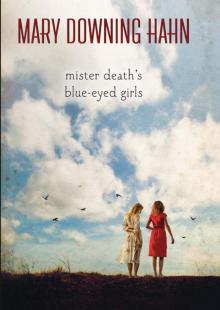 Mister Death's Blue-Eyed Girls
Mister Death's Blue-Eyed Girls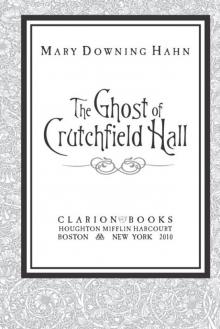 The Ghost of Crutchfield Hall
The Ghost of Crutchfield Hall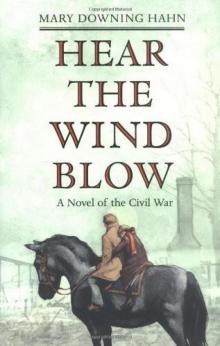 Hear the Wind Blow
Hear the Wind Blow Time of the Witch
Time of the Witch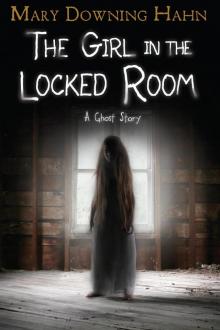 The Girl in the Locked Room: A Ghost Story
The Girl in the Locked Room: A Ghost Story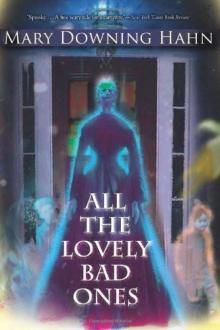 All the Lovely Bad Ones
All the Lovely Bad Ones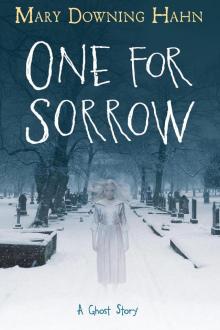 One for Sorrow
One for Sorrow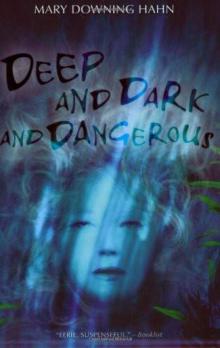 Deep and Dark and Dangerous
Deep and Dark and Dangerous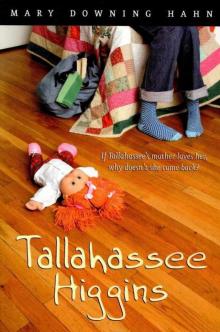 Tallahassee Higgins
Tallahassee Higgins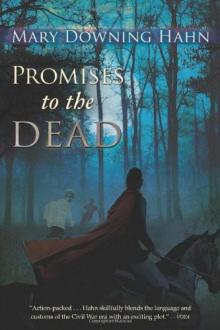 Promises to the Dead
Promises to the Dead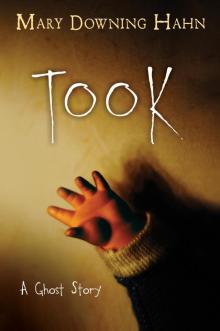 Took: A Ghost Story
Took: A Ghost Story Following My Own Footsteps
Following My Own Footsteps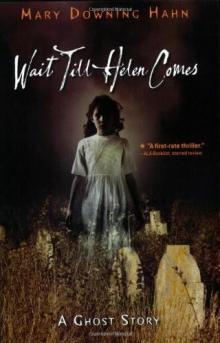 Wait Till Helen Comes: A Ghost Story
Wait Till Helen Comes: A Ghost Story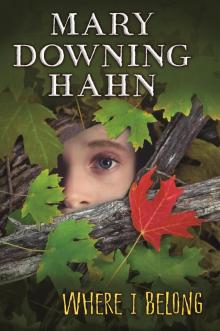 Where I Belong
Where I Belong The Spanish Kidnapping Disaster
The Spanish Kidnapping Disaster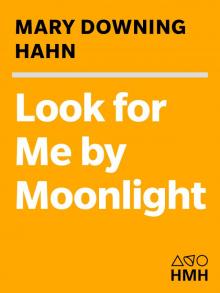 Look for Me by Moonlight
Look for Me by Moonlight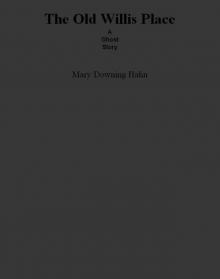 The Old Willis Place
The Old Willis Place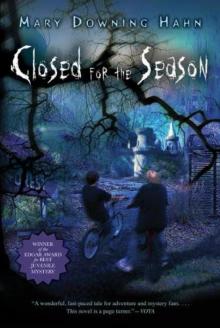 Closed for the Season
Closed for the Season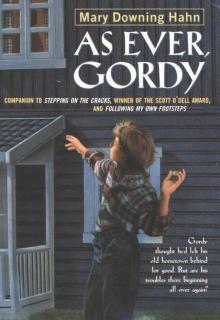 As Ever, Gordy
As Ever, Gordy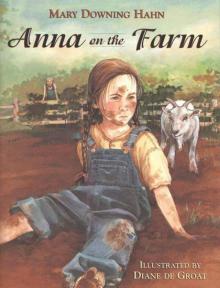 Anna on the Farm
Anna on the Farm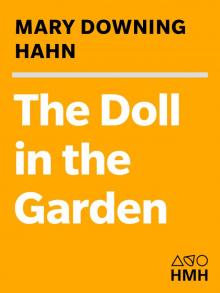 The Doll in the Garden
The Doll in the Garden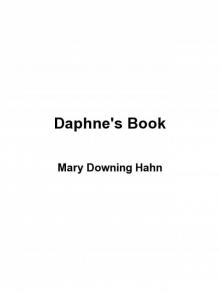 Daphne's Book
Daphne's Book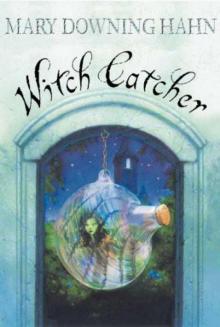 Witch Catcher
Witch Catcher The Gentleman Outlaw and Me--Eli
The Gentleman Outlaw and Me--Eli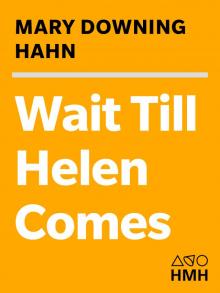 Wait Till Helen Comes
Wait Till Helen Comes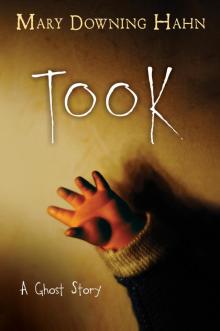 Took
Took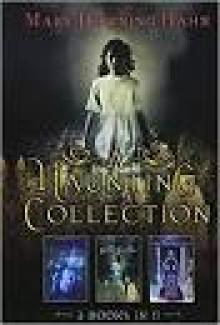 A Haunting Collection
A Haunting Collection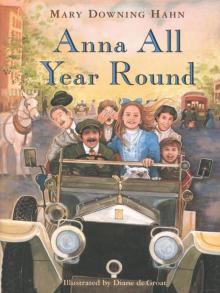 Anna All Year Round
Anna All Year Round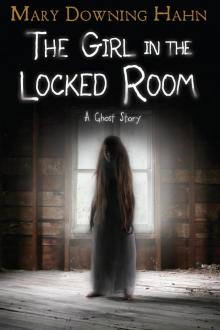 The Girl in the Locked Room
The Girl in the Locked Room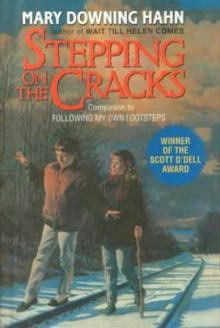 Stepping on the Cracks
Stepping on the Cracks